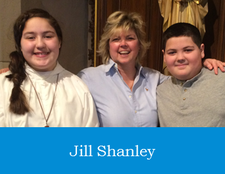The Gospel that we read on Palm Sunday is the climax of Jesus’s ministry. To say that this is a difficult Gospel to digest would be a vast understatement. It’s tempting to keep our distance from the story, to avoid connecting with it. How can we allow this Passion to affect us more deeply? Maybe the best way to take it in is to be taken in by it, to try to accompany Christ as he is anointed and then betrayed; as he prays not to have to face this terror and at the same time, through his prayer, surrenders to it. If we bring our own experiences of rejection, terror, betrayal, or suffering to Christ as we try to accompany him in his, we can begin to see that even in the bleakest of circumstances, his love holds a power that will lead to new life, and a new beginning. This week, four parishioners share their reflections on the questions: What feelings do you experience as you contemplate the Passion story? When have you experienced rejection, terror, betrayal, or suffering?

Each year as we hear the Passion, I am struck by the congregation speaking the request for Pilate to crucify Jesus. As a child, I always felt uneasy speaking “Crucify Him!” aloud. As I knew how the story ended, I could not believe that people of the time would willingly want Jesus to be tortured and killed. As an adult, I can now understand what was happening in that crowd. The crowd, being riled by the powers of the time, acted as one, not because it was just, but because it was easy. In our modern day, I often fall into the same inclination. It is easy to stay quiet about our faith and what we know to be the truth. It is easy to acquiesce and go along with the crowd on the topic at hand because sometimes it feels that our society judges us or accepts us based on our willingness to go along with the crowd. As I intone “Crucify Him!” this Palm Sunday, I will acknowledge those times when I stayed silent to please the crowd, instead of speaking out. I pray this year’s Passion will begin to give me the voice to speak up for what is right and follow the example Christ has set for each of us.

When reading the Passion, I feel a great sense of fear as a Christian. My fear comes from how Peter denies Jesus. Without Jesus directly telling me when I am going to deny him, how do I know, as a Christian, I won't deny Jesus for my own protection like Peter unknowingly did? I have experienced betrayal quite often because when a friend lies to me, I feel that the person who lied has betrayed my trust. I believe trust is a hard thing to give out when so many people lie nowadays. But the way Jesus was able to trust his disciples and his people inspires me to trust as many people as possible.

As I contemplate Jesus’ Passion according to Luke (I chose this narrative in particular because it speaks to me of forgiveness--whether we need it or give it, we all long for it), two parts speak to me in particular. I feel the crowning of thorns to be exceptionally cruel and torturous. So much is hidden and unseen about it. Jesus’s crucifixion was so public and physically brutal that not much is left to the imagination. By the crowning of thorns, I wonder if Jesus suffered for me in a hidden and silent way--for the mental tortures I sometimes feel . . . sadness, loneliness, anxiety--basically the feeling that I’m unforgivable, that part of me I keep hidden and unrepentant. I realize, to end my reflection there would be to miss the point of Jesus’ ministry and death--Jesus forgives us! “Father, forgive them; for they do not know what they are doing” (Luke 23:34). The short exchange between the repentant thief and Jesus on the cross says it all--it brings it all home! From the cross, Jesus promises the repentant, “good” thief: “Truly, I tell you, today you will be with me in Paradise” (Luke 23:43). I am saved from my sorry self! If I believe that the repentant thief represents me, then let me also pray, “Jesus, remember me when you come into your kingdom” (Luke 23:42).

When I contemplate the Passion, I feel my life flash before me. In my life when I have been afraid, sick, or worried, I have found that going apart to pray is important. I remember earlier Lents in my life. “Mum” comforting me in my sick bed, Sr. Candida leading our class at meditation, and another time as a young married man and father, when I went to Aunt Mae for consolation that only she could offer me. In many ways, I have identified with the faith that calls me to keep the commandments, take responsibility, and give to others; I believe in Jesus. In recent times however, when facing problems, suffering, or loss, I find that Jesus is with me as a friend. Now in my heart and soul I feel that Jesus would have me walk with him in my aging process, in the mental and spiritual weaknesses. His Word, if I listen, speaks to me: that it cannot be “business as usual.” In a recent homily I heard, a married deacon called out to us to not waste our suffering, but to witness to others by prayer and connect with those who suffer. As one spiritual writer puts it: “together with Jesus on the way to the Father.” I find celebrating the Eucharist, small group faith sharing, and Lenten observance vital to my spiritual life.
Take your next step: Each week of Lent, we are suggesting a journaling question to respond to. This week’s question starts with 10 minutes of reading: read the Passion according to Mark (Mark 14:1-15:47). Then grab a pen, mobile phone, or computer. At the top of the page, note, or e-mail, write: “What feelings do I experience as I contemplate the Passion story?” Write what comes from the heart. Take a few more minutes to talk to God about what you have written, and listen to God talk to you.

 RSS Feed
RSS Feed
 Like us on Facebook
Like us on Facebook Follow us on Twitter
Follow us on Twitter